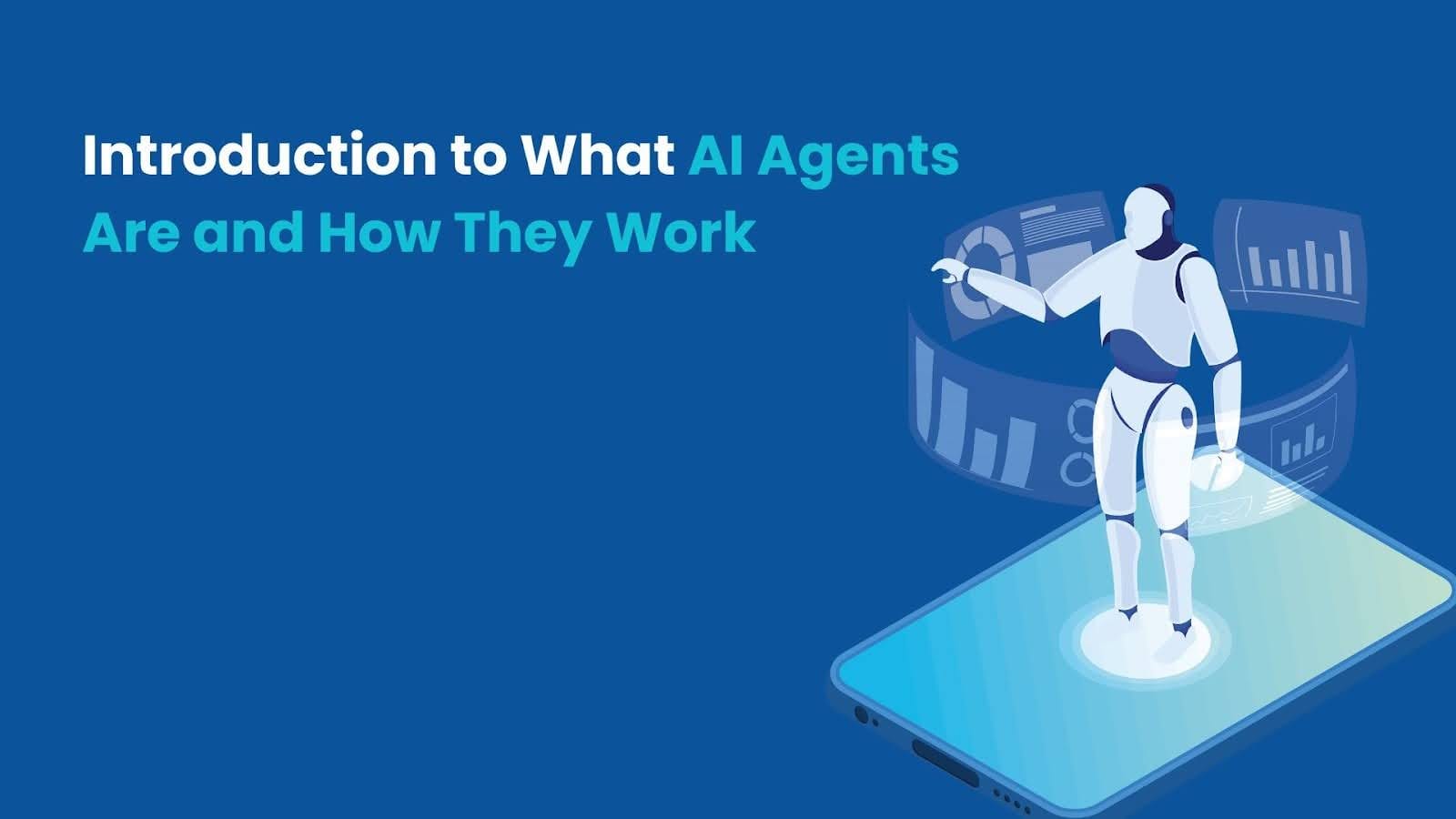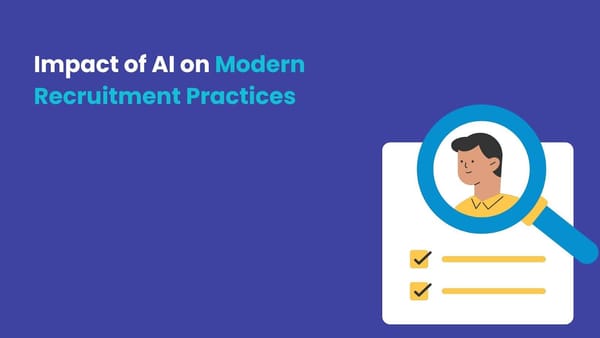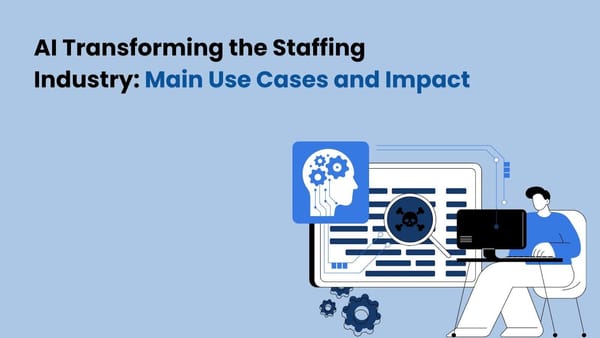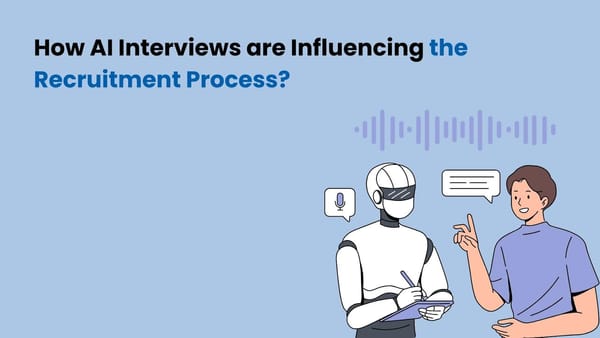Recruitment is no longer just about finding the right talent—it’s a race against time. HR teams and hiring managers juggle thousands of applications, yet struggle with manual screening, slow hiring cycles, and candidate drop-offs. Traditional recruitment methods cannot keep up with business growth, leading to missed opportunities, high costs, and inefficiencies.
This is where AI agents step in. These intelligent, self-operating systems are transforming how companies source, screen, and engage candidates. From automating repetitive tasks to enhancing candidate interactions, AI agents optimize hiring processes, reduce time-to-hire, and improve recruitment outcomes.
But how exactly do AI agents work? What makes them smarter, faster, and more effective than traditional hiring tools? In this guide, we’ll break down what AI agents are, how they function, and why businesses—especially in the UAE—are rapidly adopting them to scale their workforce without sacrificing quality.
The buzz around AI agents is growing, but what exactly are they? Let’s break down what makes these digital assistants so powerful in modern business.
What Is an AI Agent?
An AI agent is a self-operating system designed to analyze data, make decisions, and execute tasks with minimal human input. Unlike traditional software, which follows rigid, pre-programmed instructions, AI agents learn, adapt, and act based on real-time information.
The demand for AI agents is skyrocketing. The AI agents market is projected to grow from USD 5.1 billion in 2024 to USD 47.1 billion by 2030, fueled by rapid advancements in natural language processing (NLP) and machine learning. This 44.8% CAGR growth reflects how businesses across industries—including recruitment—are increasingly relying on AI agents to streamline workflows, reduce costs, and improve decision-making.
For example, imagine a recruitment agency handling 500 job applications for a single role. A recruiter would need days or even weeks to manually screen resumes, shortlist candidates, and send follow-ups. An AI agent, however, can analyze all applications in minutes, rank candidates based on job fit, and automatically send personalized responses to keep applicants engaged.
This shift isn’t just about speed—it’s about scalability. With businesses growing at an unprecedented pace, the need for efficient, AI-driven hiring solutions is stronger than ever. AI agents enable recruiters to automate repetitive tasks, allowing them to focus on strategic hiring decisions and candidate engagement.
AI agents aren’t just smart software—they operate with autonomy, adaptability, and a clear goal. Understanding these traits is key to unlocking their full potential.
Key Characteristics of AI Agents
Unlike traditional software that follows a fixed set of instructions, AI agents can adjust their approach based on new information, making them invaluable in fast-moving industries like recruitment.
Here’s what makes AI agents truly effective:
1. Autonomy: Working Without Constant Oversight
One of the biggest advantages of AI agents is their ability to operate on their own. Once set up, they can analyze data, make decisions, and execute tasks without needing human intervention at every step. This saves time and allows businesses to focus on more strategic priorities.
Example: Instead of manually screening hundreds of resumes, an AI agent can instantly filter top candidates based on skills, experience, and relevance—freeing up recruiters to focus on interviews and hiring decisions.
2. Adaptability: Learning and Improving with Experience
AI agents aren’t static. They learn from patterns, feedback, and interactions, continuously refining their performance. The more they process, the smarter and more efficient they become, ensuring that outcomes improve over time.
Example: A chatbot handling candidate queries can recognize frequently asked questions, improve response accuracy, and even detect the tone of messages to personalize interactions better.
3. Goal-Oriented Behavior: Staying Focused on Results
For AI agents, it’s not just executing tasks—they’re built with specific objectives in mind. Whether it’s improving hiring efficiency, reducing errors, or increasing engagement, they prioritize tasks that align with business goals.
Example: A recruitment AI agent can track hiring trends, predict workforce needs, and suggest proactive hiring strategies, ensuring businesses stay ahead of talent shortages.
Knowing what makes AI agents unique is just the start. Now, let’s explore how they process information, make decisions, and execute tasks without human intervention.
How Do AI Agents Work?
AI agents don’t just follow commands—they think, analyze, and act to complete tasks efficiently. They process data, make decisions, and take action in real time, making them invaluable for businesses looking to automate complex processes.
Here’s how they do it:
1. Perception: Understanding the Environment
AI agents begin by collecting information from various sources, including databases, user interactions, emails, and even social media. They analyze this data using natural language processing (NLP), machine learning, and predictive analytics to understand patterns and make sense of what’s happening.
Example: A recruitment AI agent scans hundreds of job applications from multiple job boards, tracking qualifications, experience, and even sentiment in cover letters to identify the best candidates.
2. Decision-Making: Choosing the Best Action
Once the AI agent gathers enough information, it uses logic, predictive models, and pre-set rules to determine the best response. This step ensures that decisions are data-driven rather than random guesses.
Example: If a company’s hiring process prioritizes candidates with specific certifications, the AI agent automatically ranks resumes based on those qualifications—saving recruiters hours of manual work.
3. Action Execution: Getting Things Done
After making a decision, the AI agent carries out the necessary action—whether it’s sending an email, scheduling an interview, updating a database, or notifying a recruiter. The process is instantaneous, reducing delays and improving efficiency.
Example: Instead of waiting for a recruiter to manually schedule interviews, an AI agent automatically finds available time slots on both the recruiter’s and candidate’s calendars, sends invites, and confirms attendance—eliminating endless back-and-forth emails.
Not all AI agents function the same way. Some react instantly, while others learn and evolve. Here’s a look at the different types and how they operate.
Types of AI Agents
AI agents come in different forms, each designed to perform specific tasks based on their level of intelligence and learning ability.
Let’s break them down:
1. Reactive Agents: Fast but Forgetful
These AI agents operate only in the moment—they respond to inputs without memory or learning ability. They are great for quick, repetitive tasks but cannot improve over time.
Example: A basic chatbot that provides pre-programmed responses to frequently asked questions, such as “What are your company’s job openings?” but cannot recall previous conversations.
2. Limited Memory Agents: Smarter with Experience
These agents store temporary information and make decisions based on recent interactions. They are commonly used in AI-powered recommendation systems and dynamic decision-making processes.
Example: A recruitment AI that remembers candidate interactions—if someone applied before but wasn’t a match, the system reassesses them for future roles, improving hiring efficiency.
3. Goal-Based Agents: Decision-Makers with Purpose
These AI agents evaluate different possibilities before selecting the best action. They don’t just react; they strategize based on business objectives.
Example: An AI hiring assistant that predicts which candidates are most likely to accept a job offer based on market trends, competitor salaries, and past applicant behavior.
4. Learning Agents: Constantly Improving
The most advanced AI agents use machine learning and reinforcement learning to continuously evolve. They adjust their decision-making process over time, becoming more efficient and accurate.
Example: A talent acquisition AI that tracks hiring trends, refines candidate selection criteria, and personalizes communication based on past hiring successes—ensuring recruiters get the best candidates faster.
With AI revolutionizing industries, recruitment is no exception. Here’s how AI agents are making hiring faster, smarter, and more efficient for businesses worldwide.
AI Agents in Recruitment and Staffing
AI agents are changing how companies hire by automating repetitive tasks, improving candidate engagement, and making recruitment faster and more efficient. With businesses facing high application volumes and long hiring cycles, AI-powered solutions help recruiters focus on hiring the right talent instead of being buried in manual work.
1. Automating Resume Screening
Sorting through resumes manually is time-consuming and prone to human error. AI agents analyze thousands of applications in seconds, filtering candidates based on skills, experience, and qualifications.
Using machine learning and natural language processing (NLP), these systems can identify top candidates without bias, ensuring that recruitment decisions are based on objective criteria. This automation allows HR teams to speed up hiring without compromising on quality.
2. Enhancing Candidate Engagement
A lack of communication is one of the biggest frustrations for job seekers. AI-driven chatbots and virtual assistants keep candidates informed, engaged, and updated throughout the hiring process.
From answering FAQs to sending personalized application updates, AI ensures that no candidate feels ignored. Automated reminders for interviews and follow-ups also help reduce drop-offs, improving overall candidate experience.
3. Improving Hiring Efficiency
Delays in recruitment often stem from inefficient processes and poor coordination between hiring teams. AI agents streamline workflows, track progress, and identify top candidates faster.
Integrated with Applicant Tracking Systems (ATS), AI can match candidates to roles more effectively, schedule interviews instantly, and reduce time-to-hire. The result? Faster placements, lower costs, and a better hiring experience for both employers and candidates.
Beyond hiring, AI agents are transforming business efficiency. Let’s explore the key benefits they bring, from cost savings to smarter decision-making.
Benefits of AI Agents for Businesses
AI agents are helping businesses operate more efficiently, scale seamlessly, and cut costs by automating time-consuming tasks and improving decision-making.
1. Faster Decision-Making
AI processes vast amounts of data instantly, allowing businesses to make informed decisions without delays. Whether it's screening candidates, analyzing customer behavior, or optimizing workflows, AI ensures that teams can act quickly based on real insights.
With AI eliminating bottlenecks, companies can reduce manual workload and focus on strategic growth instead of getting stuck in repetitive tasks.
2. Scalability
AI agents handle large volumes of work effortlessly, making them ideal for businesses that need to scale operations without adding headcount.
For example, companies experiencing seasonal hiring spikes can rely on AI to process thousands of applications efficiently. Similarly, AI-driven customer service bots manage multiple inquiries at once, ensuring seamless support without increasing staff.
3. Cost Reduction
AI-driven automation reduces reliance on manual labor, cutting down operational costs. Businesses save money on recruitment, customer support, and administrative tasks, reallocating resources to areas that drive growth.
By handling tasks like resume screening, data entry, and appointment scheduling, AI helps companies work smarter while keeping expenses low.
4. Personalization
AI agents use real-time data to create personalized experiences, whether it's recommending jobs to candidates, customizing product suggestions for customers, or tailoring onboarding experiences for new hires.
Personalized interactions lead to higher engagement, better user satisfaction, and stronger brand loyalty, helping businesses build lasting relationships with their customers and employees.
AI isn’t perfect. While it solves many problems, it comes with challenges. Understanding these limitations is crucial for businesses adopting AI-driven solutions.
Challenges and Limitations of AI Agents
Despite their advantages, AI agents come with challenges that businesses need to address to ensure responsible and effective use.
1. Bias in AI Models
AI learns from historical data, which means it can inherit biases present in past decisions. If trained on biased hiring patterns, an AI system may unintentionally favor certain candidates over others.
To prevent this, companies need to audit AI systems regularly, diversify training data, and apply fairness algorithms to ensure decisions are unbiased and ethical.
2. Data Privacy Concerns
AI agents handle large amounts of sensitive information, raising privacy and security risks. Businesses must comply with data protection regulations like the UAE’s privacy laws and global frameworks like GDPR to safeguard user data.
Implementing encryption, access controls, and transparency in data usage is essential to maintaining trust and preventing breaches.
3. Human Oversight
While AI can automate many tasks, it cannot replace human judgment in critical decision-making. AI lacks empathy, intuition, and the ability to assess complex situations beyond data patterns.
For example, AI can shortlist candidates based on skills, but it cannot evaluate cultural fit or soft skills as well as a human recruiter. That’s why AI should enhance—not replace—human decision-making to create a balanced hiring process.
Despite the challenges, AI’s role in recruitment is only growing. Here’s a glimpse into the future of AI-driven hiring and what’s next for businesses.
Future of AI Agents in Recruitment
AI agents are rapidly evolving, reshaping how companies source, assess, and hire talent. As technology advances, AI will play an even greater role in making recruitment faster, smarter, and more predictive. Here’s what’s coming next:
1. Advancements in Machine Learning: Smarter AI for Better Hiring Decisions
AI agents are becoming more intelligent and precise thanks to machine learning (ML) advancements. Instead of just following pre-set rules, future AI models will continuously refine their decision-making based on new data and hiring trends.
With deep learning and NLP improvements, AI will better understand job descriptions, candidate intent, and recruiter preferences, leading to more accurate candidate recommendations. These advancements will help businesses reduce mismatches, improve diversity, and speed up hiring.
2. AI-Powered Predictive Hiring: Forecasting Candidate Success
AI is moving beyond resume screening—it’s now being trained to predict a candidate’s long-term success within a company. By analyzing past hiring patterns, performance data, and industry trends, AI agents will help recruiters identify candidates who are not just qualified but also likely to thrive in a given role.
Predictive hiring will allow companies to:
- Reduce turnover rates by selecting candidates with higher retention potential.
- Improve workforce planning by forecasting talent gaps before they occur.
- Enhance candidate matching by identifying skills that align with future job demands.
With data-driven insights, businesses can proactively build stronger, future-ready teams rather than reacting to hiring needs as they arise.
3. Integration with Other HR Tech: Creating Seamless Hiring Experiences
AI agents will no longer work in isolation. Future AI-powered recruitment solutions will seamlessly integrate with HR systems, Applicant Tracking Systems (ATS), video interview platforms, and employee onboarding tools.
This connected ecosystem will enable the following:
- End-to-end automation from candidate sourcing to onboarding.
- Better collaboration between HR teams, hiring managers, and AI-driven tools.
- Enhanced candidate experiences with faster responses, personalized interactions, and smoother hiring processes.
AI in hiring is no longer theoretical—it’s happening now. Meet TidyHire, the AI-powered platform redefining recruitment with automation, intelligence, and seamless efficiency.
TidyHire: The Future of AI-Driven Recruitment
Recruitment is changing, and manual hiring processes can’t keep up with today’s demands. Sorting through hundreds of resumes, chasing passive candidates, and sending follow-ups eats away at valuable time—time recruiters could be spending on hiring top talent.
That’s where TidyHire comes in - TidyHire is an AI-powered recruitment platform built for businesses that need fast, efficient, and scalable hiring solutions. TidyHire removes the heavy lifting from outbound recruitment, allowing hiring teams to focus on what matters—building relationships with top talent.
Here's how TidyHire transforms the hiring process:
1. Smarter Candidate Sourcing with AI
TidyHire’s Recruiting Intelligence Agent (RIA) changes the way recruiters find talent. Instead of manually searching multiple job boards and databases, RIA automatically scans 700+ million profiles across 30+ sources, identifies qualified candidates, and delivers verified contact details—all within seconds.
For recruitment agencies, tech companies, and fast-growing businesses, this means faster access to top-tier talent without wasting hours on manual research.
2. AI-Driven Outreach That Gets Responses
Sending generic messages won’t cut it anymore. TidyHire’s AI creates hyper-personalized communication that speaks directly to each candidate’s background, skills, and interests—boosting response rates.
With automated follow-ups, recruiters no longer have to chase candidates manually. Whether it's LinkedIn, email, SMS, or WhatsApp, RIA ensures consistent engagement without spamming.
3. Chrome Extension for Instant Sourcing
With the TidyHire Chrome Extension, recruiters can source candidates directly from professional networking sites like LinkedIn. The extension captures contact details, enriches candidate data, and integrates with existing workflows, making outbound hiring seamless and efficient.
4. Data-Driven Recruitment with Actionable Insights
Hiring is no longer a guessing game. TidyHire’s analytics dashboard provides:
- Real-time reports on recruitment campaigns.
- Candidate engagement insights to improve outreach.
- Tracking for sourcing and hiring success rates.
With data-backed recruitment decisions, businesses can optimize their hiring strategies and reduce time-to-hire.
5. Scalability Without the Overhead
For companies experiencing rapid hiring growth, TidyHire ensures effortless scalability. Whether you’re hiring 10 or 1,000 candidates, the platform automates outreach, sourcing, and follow-ups—freeing up recruiters to focus on hiring the right people.
For high-volume or specialized hiring needs, businesses can also leverage Xceptional Recruiters—a premium service that pairs AI-powered automation with elite hiring experts for culture-aligned recruitment at scale.
6. Seamless Integration with Your Recruitment Tools
TidyHire fits right into existing hiring workflows, integrating with:
- Slack & Microsoft Teams for real-time collaboration.
- Applicant Tracking Systems (ATS) to streamline hiring pipelines.
- Recruitment CRMs & HR tools for smooth hiring operations.
Conclusion
Hiring shouldn’t be a slow, repetitive process. Sifting through resumes, chasing candidates, and managing follow-ups can drain time and energy—time that should be spent building great teams.
TidyHire changes the game. With AI-powered sourcing, personalized outreach, and real-time insights, recruiters can find top talent faster, engage candidates effortlessly, and hire smarter—without the manual grind.
The best companies move fast. Don’t let outdated hiring slow you down. Book a demo with TidyHire today and make every hire count.






